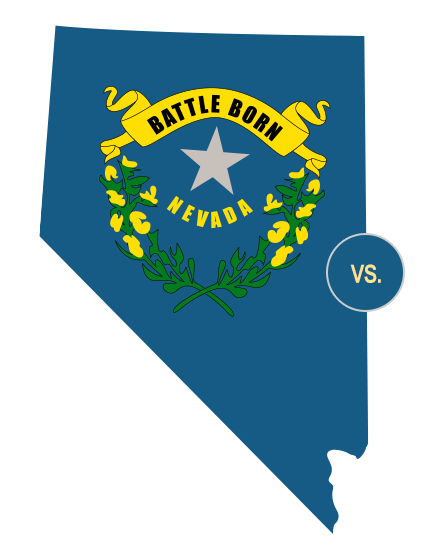
In all the years I've been using NCH the service has been great with my filings with the State of Nevada and answering any of my questions or concerns.

Nevada is #1 in Lawsuit Protection
Be Your Own Sole Proprietor
Be Your Own Sole Proprietor
You don’t need to live in Nevada to enjoy the best asset and lawsuit protection a Nevada-registered business can provide


Starting a Sole Proprietorship in Nevada
Are you considering a sole proprietorship in Nevada but unsure if it’s the right choice? Keep reading to find out, including the sole proprietorship in Nevada taxes that you’ll have to pay.
What is Sole Proprietorship?
A sole proprietorship is also known as a sole trader or simply a proprietorship. It is the quickest and easiest way to start a business as it comprises only one venture owner and lacks strict government regulations.
Because of this, many individuals, self-contractors, and consultants prefer to start a sole proprietorship. Once their venture has assets and becomes successful, they either remain a proprietorship or expand to a limited liability or corporate entity.
Sole proprietors conduct business under their own names, as creating a corporation or trade name isn’t required. They pay personal income tax based on profits earned from their company and don’t have to file a separate tax return. This means all gains, losses, and other taxable items are combined.
Understanding a Sole Proprietorship
If you’re looking for a simple and quick way to start a business, consider registering for a sole proprietorship. You won’t need to worry about federal or state forms, and it has few regulatory burdens, making it the most recommended step for a startup.
When you apply for a sole proprietorship in Nevada, you are the lone owner of your business. Therefore, your personal and the venture’s finances are the same.
Sole Proprietorships vs. Other Business Structures
There are many differences between a sole proprietorship and other business structures.
One key distinction lies in the level of personal liability. The liabilities are unlimited in a sole proprietorship versus LLC. In a sole proprietorship, there is only one owner who is personally liable for all business debts and obligations. If the business fails or faces legal action, the owner's personal assets may be at risk.
Sole proprietorships are also the simplest form of business structure. These are easy to set up and require minimal paperwork and legal formalities to establish. In contrast, partnerships, corporations, and LLCs involve drafting partnership agreements or articles of incorporation, obtaining state business licenses and permits, and fulfilling compliance requirements.
Moreover, sole proprietorships are pass-through entities; business income is reported on the owner's personal tax return. Other business structures may have their own separate tax obligations and are subject to different tax rates and rules.
Taxation in Sole Proprietorships
As a sole proprietor operating in Nevada, you must report your business income and expenses on your personal tax return using Schedule C of Form 1040. This means that your business profits are taxed at your individual income tax rate, which ranges from 10% to 37%. The said rate will depend on the amount of taxable income.
Although Nevada doesn’t impose a state income tax, sole proprietors are still subject to other taxes, such as the federal self-employment tax. This tax is calculated based on net earnings from self-employment, which includes business income minus deductible business expenses.
The self-employment tax rate is 15.3%—12.4% for Social Security and 2.9% for Medicare.
Forming a Sole Proprietorship
As mentioned earlier, starting this particular business structure is fast and easy. In fact, you can start a sole proprietorship online. You don’t need to complete much paperwork, meaning you can kickstart your venture faster. However, depending on your state and type of business, you may need to obtain a license or permit.
While some business structures require a checking account, sole proprietors can manage their finances through their personal accounts. Depending on your needs, you will also need various documents. For instance, if you hire employees, you must secure an employee identification number (EIN) from the Internal Revenue Service. In addition, selling taxable products requires you to register for a sales tax license.
ADVANTAGES
- Ease of Formation
- Pass-Through Tax Treatment
DISADVANTAGES
- Personal Liability
- Lack of Continuity
- Hard to Attract Investors
Types of Sole Proprietorship
Sole proprietorships can operate as three different entities:
Independent Contractors
Independent contractors are individuals who provide goods or services to clients or companies on a contract basis. They are self-employed and operate as sole proprietors. However, they must operate under the client's processes and conditions.
Business Owners
This category covers entrepreneurs who own and operate their businesses as sole proprietors. Business owners have more autonomy than independent contractors. They can choose how and with whom they work.
Franchisees
Franchisees are sole proprietors who purchase the right to use an existing company’s trademarks, brands, and proprietary knowledge. They’re very similar to business owners, only that they’re using the business model of a more established brand.
Sole Proprietorship Cost
Another reason many prefer to register a sole proprietorship is the low-cost budget to register a sole proprietorship. But you must remember the cost varies depending on the nature of your business.
Unlike an LLC or corporation, you don’t need to file with the state regarding a proprietorship. However, while there is no initial registration fee, you must file for sales or service tax numbers.
There are various expenses associated with starting a sole proprietorship to remember. For instance, you must factor in equipment like tables, electronics, and machinery. Moreover, some businesses require specific licenses, permits, and certifications, with costs and renewal fees.
Another thing to consider is your working environment. Will you be working from home or renting an office? How do you plan to meet with clients or serve customers?
Does My Sole Proprietorship Need a Business Bank Account?
While Nevada does not legally require sole proprietors to open a separate business bank account, it is highly recommended that they do so. Separating personal and business finances allows you to maintain accurate records, track expenses, and simplify tax filing. This allows you to make informed decisions about your business and plan for future growth.
A dedicated business bank account can also help establish your business's legitimacy and professionalism in the eyes of customers, vendors, and financial institutions.
Register your Sole Proprietorship in Nevada with NCH
Is a sole proprietorship the right business structure for your venture? Find out by consulting an expert from NCH, the state’s leading business formation service provider.
Our services go beyond paperwork. We’ll aid you with the required forms and payroll management. We’ll also help you with sole proprietorship in Nevada taxes, including key considerations, deductions, and tax obligations for individuals operating as sole proprietors in the state.
Make the most of our private consulting services for all your tax and legal concerns. Partner with us so we can develop effective solutions to minimize your liabilities and protect your wealth.
Contact NCH today at 1-800-508-1729 for your FREE consultation.
Free Consultation
Speak With a Business Expert
Related Articles:
Free E-Book
 24 Hour LLC Guarantee
24 Hour LLC Guarantee



